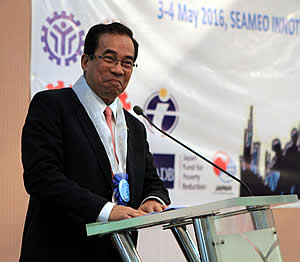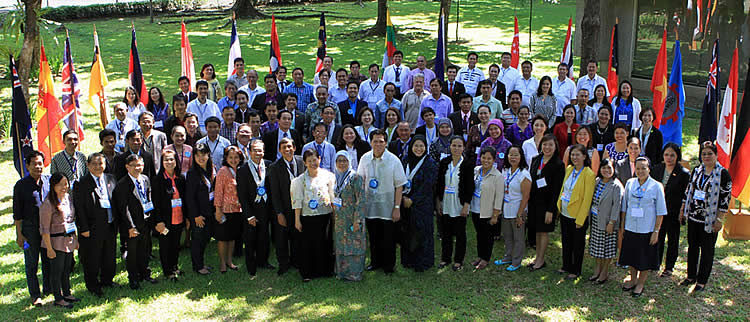 The three FOCs represented three priority industry/study programs identified as areas for collaboration among the TVET institutions represented in the country-level workshop. These were hospitality and tourism, agriculture and fisheries, and electronics, mechatronics, and manufacturing. Identified collaborations were mainly on benchmarking, teacher exchange and student exchange within the three priority industry/study programs. Details of these collaborations were expounded on frameworks of collaboration that each participant signed based on the industry group they joined.
The three FOCs represented three priority industry/study programs identified as areas for collaboration among the TVET institutions represented in the country-level workshop. These were hospitality and tourism, agriculture and fisheries, and electronics, mechatronics, and manufacturing. Identified collaborations were mainly on benchmarking, teacher exchange and student exchange within the three priority industry/study programs. Details of these collaborations were expounded on frameworks of collaboration that each participant signed based on the industry group they joined.
Attended by more than 100 policymakers and experts in technical and vocational education and training (TVET) in the Philippines and five other Southeast Asian countries, the Technical Education Skills and Development Authority (TESDA) of the Philippines served as the main host of the workshop, with support from the Department of Education (DepEd). Workshop co-organizers included the SEAMEO Secretariat (SEAMES), SEAMEO Regional Center for Graduate Study and Research in Agriculture (SEARCA), SEAMEO Regional Center for Vocational and Technical Education and Training (VOCTECH), and the Asian Development Bank (ADB) through the Japan Fund for Poverty Reduction.
TESDA is the lead TVET institution in the Philippines, with various vocational schools and state colleges and universities offering TVET courses. DepEd, on the other hand, started with the K-to-12 basic education curriculum in school year 2011-2012. This curriculum expands primary and secondary education to 12 years, adding two final high school years with option for three tracks: academic, technical-vocational-livelihood, and sports and arts.
TVET has been identified as a priority area in the Southeast Asian region. This came from consultations held in 2012 and initiated by the Southeast Asian Ministers of Education Organization (SEAMEO) and the ADB through the SEAMEO College Project. SEAMEO affirmed the importance of TVET in September 2014 during the Strategic Dialogue of Education Ministers (SDEM), including it in the Post-2015 seven priority areas of SEAMEO.
As a form of education that responds to poverty reduction, economic recovery, and sustainable development, policymakers have given greater attention to TVET, particularly in the pursuit of the ASEAN economic integration by the end of 2015.
The Philippine workshop was the sixth among seven country-level workshops planned to collate the results from previous TVET regional meetings, and develop partnership and commitment among the participating TVET institutions, which will lead towards harmonization and internationalization. The previous country-level workshops were held in Cambodia (9-10 October 2015), Thailand (26-28 November 2015), Myanmar (4-5 December 2015), Lao PDR (22-23 December 2015), and Malaysia (1-3 March 2016). The last country-level workshop will be held in June 2016 in Brunei Darussalam.
The country-level workshops served as platforms for establishing partnerships and networking among the participating TVET institutions from the host country and other Southeast Asian countries. They aimed to explore collaborative mechanisms, action plans, and commitments for piloting student and teacher exchanges and other joint activities as well as discuss on continuous communication and networking among involved parties.
The workshop participants included TVET policymakers and experts, directors/representatives of TVET institutions and school heads/representatives of TVET schools from Brunei Darussalam, Cambodia, Indonesia, Lao PDR, Philippines, and Thailand. Philippine participants came from TESDA training institutions, private TVET institutions, and DepEd schools. (Nova A. Ramos)
